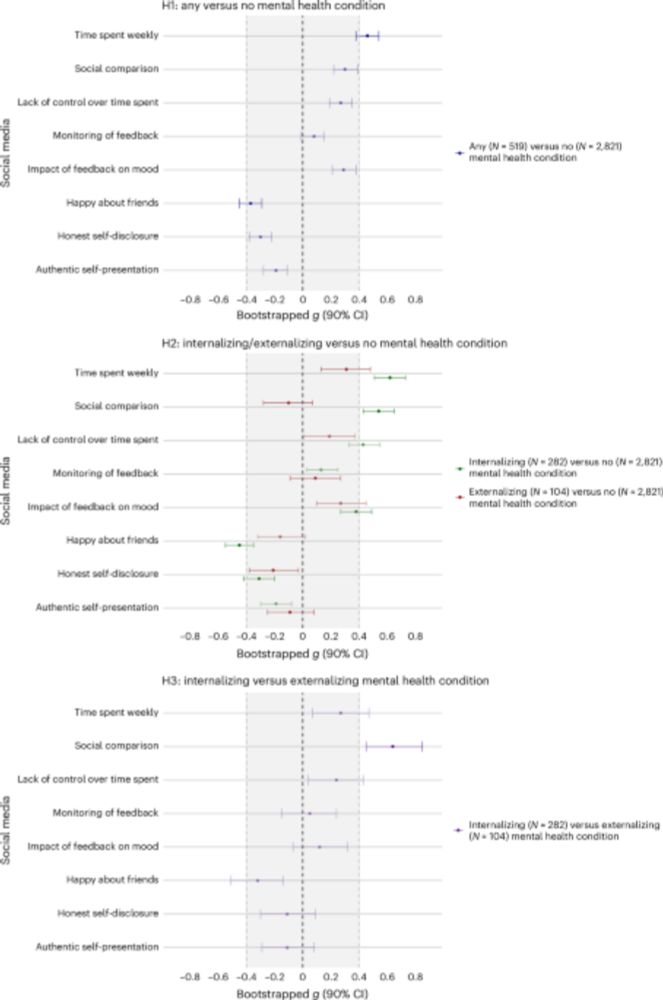How do we know whether universities empower their graduates to pursue meaningful work (and—I would add—then actually experience that work as fulfilling)? What does it mean for graduates to contribute to their communities, through work or outside of it?
28.01.2026 15:13 — 👍 0 🔁 0 💬 0 📌 0

📢now forthcoming in ECMA!
The Class Gap in Career Progression: Evidence from US Academia
Class is rarely a focus of research or DEI in elite US occupations.
Evidence suggests it should be: we find a large class gap in at least one occupation - tenure-track academia...🧵
27.01.2026 22:34 — 👍 136 🔁 55 💬 5 📌 14


I am thrilled to announce that this framework is out!
Who is responsible for inequality?
@tanialombrozo.bsky.social and I show that answers depend on whether people are judging causes or obligations, and the past vs the future.
doi.org/10.1177/1745...
06.01.2026 19:57 — 👍 29 🔁 9 💬 2 📌 0
Apply - Interfolio
{{$ctrl.$state.data.pageTitle}} - Apply - Interfolio
I’m hiring a postdoc! Flexible in terms of details, but I’m looking for someone to collaborate with on research about labor market inequality. I’ll review applications as they come in and the posting just went up here:
apply.interfolio.com/178873
09.12.2025 19:36 — 👍 36 🔁 28 💬 0 📌 4

New paper alert!
"Public Speakers With Nonnative Accents Garner Less Engagement" -- now out in Psych Science!
This is my first graduate student's first first-author paper (and it was her first-year project).
Short THREAD on the results:
04.12.2025 16:59 — 👍 52 🔁 23 💬 3 📌 3
This is an amazing idea—I never thought about it this way but upon reading it it makes so much sense and explains a lot of what occurs in the world. Huge congrats to you Jin on all of the amazing work this year amidst all that is happening and all fingers crossed!
26.11.2025 15:24 — 👍 2 🔁 0 💬 1 📌 0

Waiting time during admission procedures increases social inequalities in higher education | PNAS
Many domains in life require people to wait to access better outcomes, such as waiting
in line to access prized tickets for a show, waiting to obta...
Happy to share our latest study published in PNAS.
Using data from 274,316 French students, we find that lower-SES students are less likely to wait for better university offers, even when waiting would lead to more prestigious or better-fit programs.
www.pnas.org/doi/10.1073/...
26.11.2025 09:26 — 👍 44 🔁 19 💬 1 📌 0
Another reminder that if you got students who wanna do a social psych PhD focusing on identities (specifically Asian, Latine, MENA Americans), I’m recruiting! I’m hustling hard here so pls send people my way 😅
see website for details www.pbandjlab.com
18.11.2025 04:34 — 👍 44 🔁 32 💬 2 📌 0
OSF
People are lazy--except when they're watching other people work hard.
My student Emily Zohar just published her first first-authored paper, and it reveals something surprising about effort and social norms. /1
osf.io/preprints/ps...
05.11.2025 00:54 — 👍 21 🔁 11 💬 1 📌 0

iconic scene from Grey's Anatomy. Meredith Grey in scrub telling Derek "so pick me, choose me, love me"
On election day, I wanna announce that I am recruiting social psych PhD students for my lab at UIC. My lab focuses on racial identities (esp Asian, Latino, MENA Americans) and intra-minority conflict/ coalition. So please tell your students to pick me! All details on my website: www.pbandjlab.com
04.11.2025 15:17 — 👍 48 🔁 35 💬 1 📌 1
Northwestern Faculty Search -
📢POSTDOC POSITION ANNOUNCEMENT📢
@nourkteily.bsky.social & I are recruiting a postdoc in the #LitowitzCenter for Enlightened Disagreement. We seek research excellence regarding navigating conflict.
Application deadline: Nov. 17.
Salary: ~$80k.
facultyrecruiting.northwestern.edu/apply/MjQzNw==
05.10.2025 18:24 — 👍 20 🔁 16 💬 0 📌 2
Apply - Interfolio
{{$ctrl.$state.data.pageTitle}} - Apply - Interfolio
#Psychjobs
My former institution Colby College is hiring a tenure track in intergroup relations, broadly defined & open to many psych areas (not just social). This is my replacement line. I truly enjoyed my time at Colby and it's a great dept! Happy to answer Qs if I can.
apply.interfolio.com/172552
26.08.2025 19:50 — 👍 41 🔁 46 💬 2 📌 0
An error has occurred.
📢JOB POSTING: Senior Director for the Center for Enlightened Disagreement (CED).📢
@nourkteily.bsky.social and I seek a strategic leader to help us build the Center (see ensuing post for information about CED).
Target salary range: $125,000-$155,000.
1/2
careers.northwestern.edu/psc/hrnu_er/...
25.08.2025 14:40 — 👍 12 🔁 11 💬 1 📌 1
great ideas 1003 and 1004 @uniofstandrews.bsky.social — two semesters long, each dept on campus got 2 weeks, 4 lectures a week, each one a different prof, to share the biggest idea in the field they are most excited about.
29.07.2025 22:52 — 👍 7 🔁 0 💬 0 📌 0

Research: When It’s Time to Leave a Career You’re Passionate About
If you’re someone pursuing your passion and thinking about quitting, ask yourself: Are you staying because you want to—or because you’re afraid of what others will think? It’s easy to assume that walk...
"People flourish when they see their careers as evolving journeys rather than fixed destinations, and yet so much of the discourse around passion pursuit focuses on ceaseless perseverance...Some pursuits of passion become less tenable over time as life circumstances change."
hbr.org/2025/07/rese...
07.07.2025 17:05 — 👍 19 🔁 6 💬 1 📌 1
Congrats!!!!
23.06.2025 23:21 — 👍 3 🔁 0 💬 0 📌 0
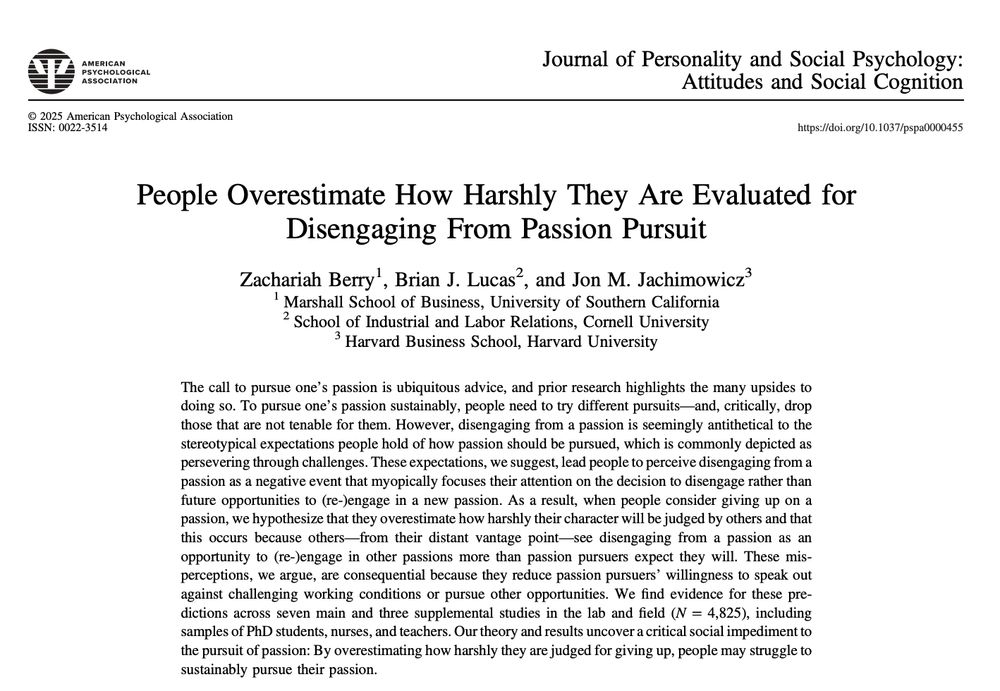
🚨 New paper alert 🚨
In my latest out now in JPSP (w/ @brianjlucas.bsky.social
& @jonj.bsky.social), we show across 10 studies (including w/nurses, teachers, & PhD students) that people considering giving up a passion pursuit overestimate how harshly others will judge them 🧵 doi.org/10.1037/pspa...
10.06.2025 15:36 — 👍 3 🔁 1 💬 1 📌 1
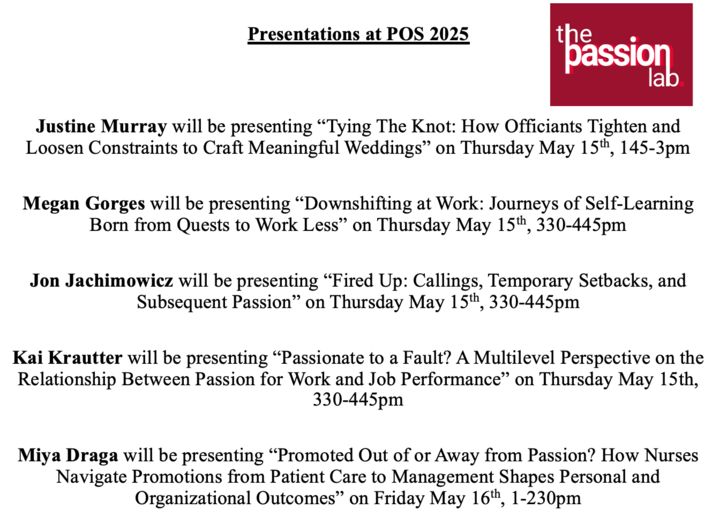
Excited to come out to @umich.edu this week for the Positive Organizational Scholarship Conference. Our lab will be well-represented with five presentations—please stop by and engage with our work, we'd love to hear what you think!
13.05.2025 21:38 — 👍 1 🔁 0 💬 0 📌 0
My editorial on how journals can earn trust.
We often use journal names as proxies for quality. This is bad bc it’s not valid. But it could be. Editors could make journal name a valid signal. And we could place value on journals that show us how they do that.
journals.sagepub.com/doi/full/10....
08.05.2025 09:25 — 👍 124 🔁 44 💬 2 📌 12
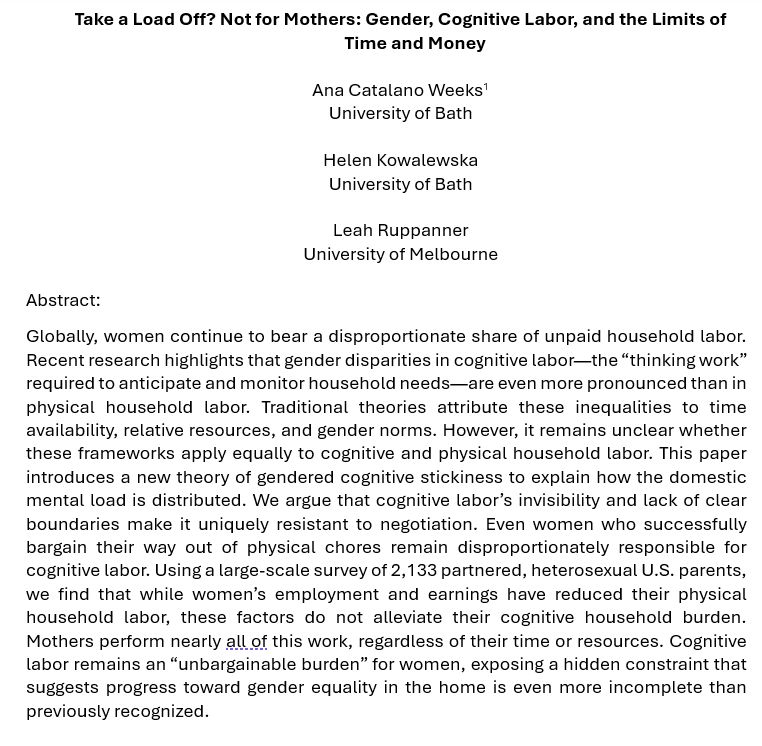
Abstract: Globally, women continue to bear a disproportionate share of unpaid household labor. Recent research highlights that gender disparities in cognitive labor—the “thinking work” required to anticipate and monitor household needs—are even more pronounced than in physical household labor. Traditional theories attribute these inequalities to time availability, relative resources, and gender norms. However, it remains unclear whether these frameworks apply equally to cognitive and physical household labor. This paper introduces a new theory of gendered cognitive stickiness to explain how the domestic mental load is distributed. We argue that cognitive labor’s invisibility and lack of clear boundaries make it uniquely resistant to negotiation. Even women who successfully bargain their way out of physical chores remain disproportionately responsible for cognitive labor. Using a large-scale survey of 2,133 partnered, heterosexual U.S. parents, we find that while women’s employment and earnings have reduced their physical household labor, these factors do not alleviate their cognitive household burden. Mothers perform nearly all of this work, regardless of their time or resources. Cognitive labor remains an “unbargainable burden” for women, exposing a hidden constraint that suggests progress toward gender equality in the home is even more incomplete than previously recognized.
🚨New working paper🚨
"Take a Load Off? Not for Mothers"
Time & money help mothers offload physical household labor —but not the mental load. Cognitive labor is an “unbargainable burden.”
w/ @helenkowalewska.bsky.social @leahruppanner.bsky.social
📄 papers.ssrn.com/sol3/papers....
Feedback welcome!
06.05.2025 11:12 — 👍 41 🔁 12 💬 0 📌 3
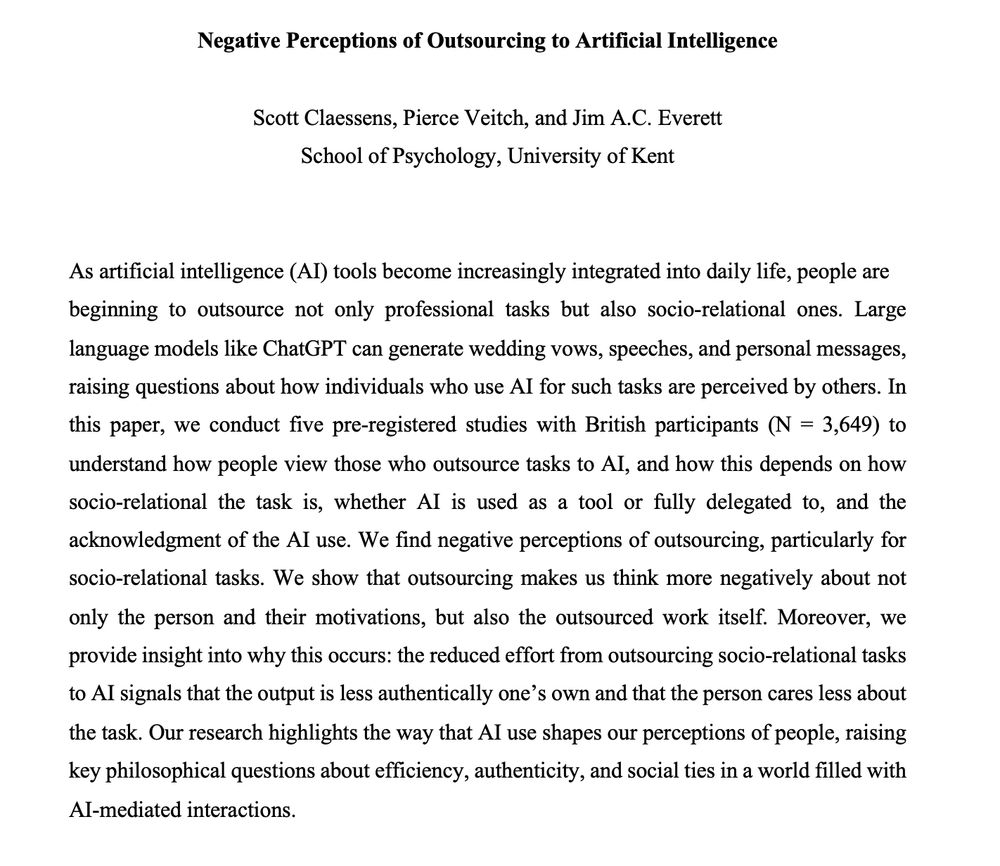
🚨New Preprint Alert! 🚨
How do people perceive those who outsource tasks to AI – especially in deeply human domains like relationships?
In a new preprint led by my PostDoc Scott Claessens and PhD student Pierce Veitch, we explore this.
01.05.2025 11:08 — 👍 24 🔁 6 💬 3 📌 1
I am teaching my phd writing workshop course this quarter, question: are there any words/phrases said to you by an advisor/mentor that stuck with you, were memorable, or particularly helpful? If so please reply below!
23.04.2025 19:45 — 👍 649 🔁 147 💬 342 📌 60
LinkedIn
This link will take you to a page that’s not on LinkedIn
🚨 I’m hiring a full-time lab manager to help me build my lab start in July or August 2025! 🚨
If you know any stellar candidates who might be interested, please send this their way.
🗓 Application review begins April 15
⏰ Final deadline is April 25
📎 Apply here ➡️ lnkd.in/evhfqzTP
10.04.2025 15:01 — 👍 52 🔁 50 💬 5 📌 3
Congrats!!!
07.04.2025 14:53 — 👍 1 🔁 0 💬 0 📌 0
OSF
📣New preprint 📣
@leonieschorrlepp.bsky.social, @domimaciejewski.bsky.social, @bringmannlaura.bsky.social, Mithra Hesselink and I wrote a paper illustrating the value of qualitative methods for checking the validity of your ESM data.
doi.org/10.31219/osf...
28.03.2025 13:55 — 👍 11 🔁 6 💬 1 📌 1
Congrats!!
27.03.2025 19:07 — 👍 0 🔁 0 💬 1 📌 0
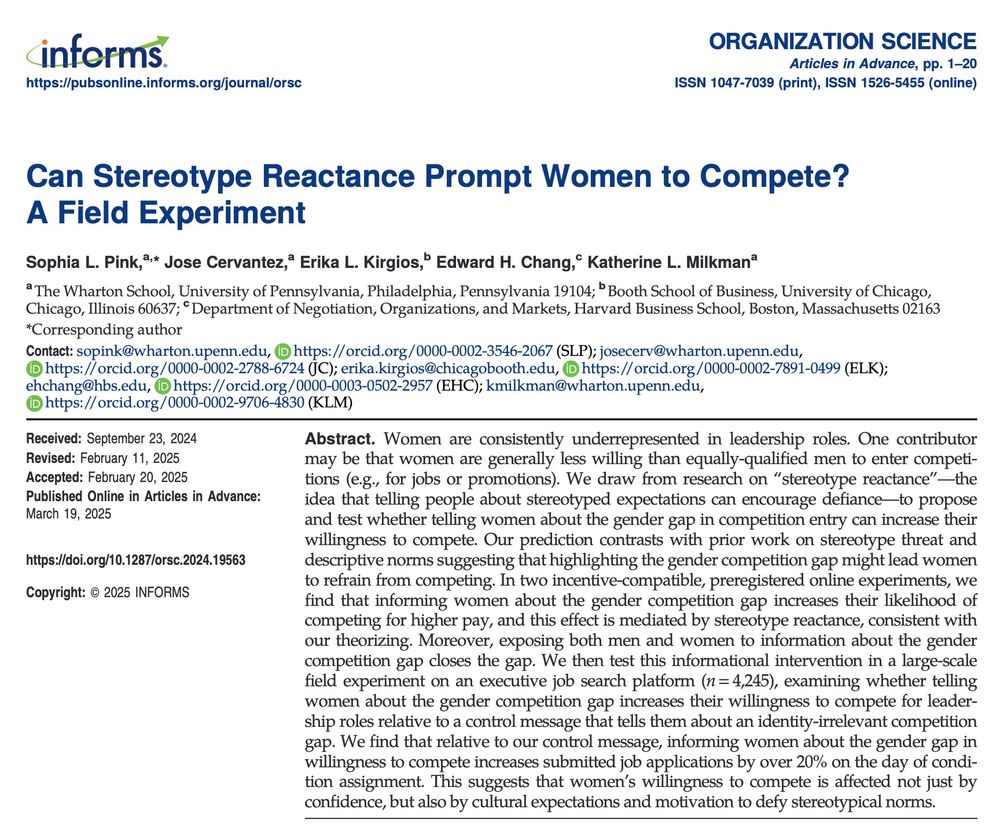
Screenshot of title + abstract of the paper.
🚨New paper alert!🚨
Women are less likely to enter competitions than men—even when equally qualified. But telling them this can change behavior.
📈 In a field experiment on a job application platform, we found that highlighting this gender gap increased the # of job apps women submitted by ~20%.
27.03.2025 14:36 — 👍 29 🔁 12 💬 2 📌 0

Remembering Psychology Professor Sam Sommers
Sam Sommers, longtime professor at Tufts, studied the psychological causes and consequences of racism
Social psychology lost a giant, and I lost a dear friend and collaborator. Still processing the loss of Sam Sommers, and probably will be for some time. Cherish the time you have with your people, folks.
now.tufts.edu/2025/03/20/r...
20.03.2025 16:10 — 👍 197 🔁 43 💬 25 📌 7
Fighting every day to deliver a city that working New Yorkers can actually afford. Mayor of New York City.
Official City of Somerville government account of Mayor Jake Wilson.
Follow @cityofsomerville.bsky.social for all things City of Somerville.
Assistant prof. at WashU enthusiastically researching personality, well-being, and morality. Vegan effective altruist, Brazilian Zouk addict, opera singer, climber.
PhD student at Wharton studying decision-making and behavior change.
www.sophiapink.com
Professor of Personality Psychology
@ruhr-uni-bochum.de
Self-Regulation, Goal Pursuit, Motivation, Personality Development
https://www.perpsy.ruhr-uni-bochum.de/pp/personen/hennecke.html.en
Official account for the Department of Infrastructure and Asset Management for the City of Somerville, MA. 🏗🚧🚜🦺 https://www.somervillema.gov/departments/iam
City Councilor, Somerville MA - Ward 3. Affordable housing, safe streets, good jobs, public transit, fighting climate change (also, biologist at Harvard Med School) https://www.benforward3.com
Professor at Michigan State University, Past President of SIOP (siop.org). Thinking about work, mobility, technology, and psychology. Fan of crosswords and chairs. Pro-empathy.
Associate professor at UIowa, Tippie College of Business. Gender, diversity, inclusion, work-family and human resource management. #SharedSisterhood book out now!
Researcher of workplace gratitude and interpersonal relationships at work | Assistant Professor of Management at TTU by day, crazy cat lady by night.
laurenlocklear.com
Testing the waters, floating the trial balloons. Professing and researching. Author / editor of a few books, but claims to have no time to write book called "Its About Time"
Assistant Prof. at University of Maryland's Smith School | PhD
Wharton OID '23 | Princeton '17
Psych & Behavioral Science Joint-PhD @ChicagoBooth | Curious about experiences that lead to human flourishing 🌷
Assistant Prof. @ IESE Business School researching Shared Reality and Merged Minds
Assistant Professor of Management, University of Cincinnati. Displaced SF Giants fan. Conflicted loyalties between Ducks and Huskies.
Asst Prof in social psychology at The Ohio State University
PhD student at HU Berlin | Interested in personality dynamics, assessment & open science | https://www.psychology.hu-berlin.de/en/personnel/91680977









